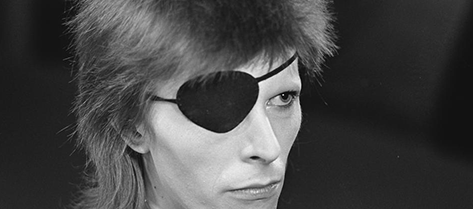Like in all areas of the arts, success in the music industry more often than not brings with it a certain ‘celebrity’ status. The general public, nosy creatures that we are, are quick to obsess over the people behind the voices that we hear on the radio. We press labels and stereotypes of ‘who they really are’ onto them in order to establish some kind of pseudo- connection; a claim for ownership disguised as affection.
The use of an alter-ego can provide an artist with a way of stepping outside of these preconceptions and reclaiming some artistic license. By ‘killing’ off the identity that society knows, they are able to start from a clean slate and put the focus back on the art itself. It’s been seen time and time again, yet no one embraced and utilised the concept like David Bowie.
Perhaps I am a victim of my generation, yet watching the iconic 1972 performance of ‘Starman’ on Top Of The Pops, I can’t help but see Bowie himself; the Ziggy Stardust persona is synonymous with his own identity for those of us who grew up in an era where Bowie was already a global star. Granted, the eclectic attire of the band on stage is verging on otherworldly, but the song itself very much has its roots here on Earth. ‘Starman’, like every song on The Rise and Fall of Ziggy Stardust and the Spiders from Mars, is a slice of classic rock ’n’ roll that works so well you’re sure you must have heard it before. Would a lost alien really sound so perfect?
Plausible or not, however, the concept behind the album gives ‘Starman’ and its other tracks an added depth of meaning. This extra layer provides food for thought to the listener, a valuable asset considering the popular music of today is often criticised as lyrically vapid and dumb. Yet this extra context is evidence that the use of an alter-ego only creates an illusion of an author death; in reality the new incarnation is a more significant ‘author’ figure than before. We are now intentionally being asked to consider the context of the character behind the album, as their story is intrinsically entwined into the music and the value we get out of it. Though it has the potential to be intellectually stimulating, the added persona and backstory also gives the listener less room for their own interpretation, and less chance for the music to speak on its own. Once again, our eyes are on the artist, rather than our ears on the art.
Maybe it’s the nature of music that its creator will always be the most immediate object of our attention. Unlike a text, which can exist independently from its creator, music is dependent on a performer in order to be brought to life. Can there be a total death of the author without a death of the music too? Or perhaps the question should be, does the author really need to die? The significant role of the Ziggy Stardust persona, during the performance of ‘Starman’ and throughout The Rise and Fall…, only serves to enhance my enjoyment of the music, not reduce it. The strong sense of character both on stage and running through the album brings the music to life; without it, the music would lack the charm and emotional power that has prompted such a connection between it and its millions of fans.
Maisie Leddy

